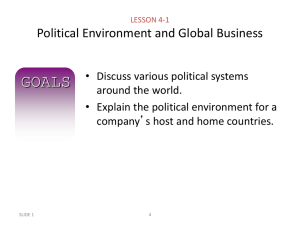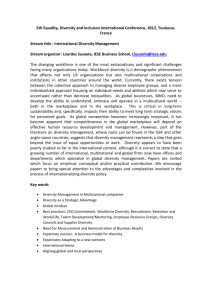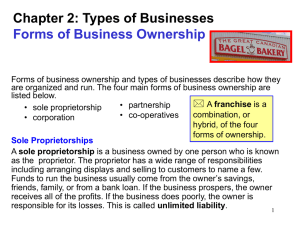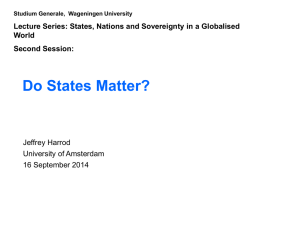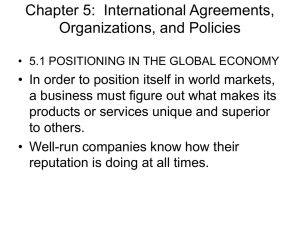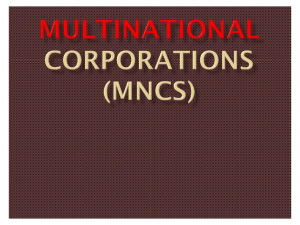- Surrey Research Insight Open Access
advertisement
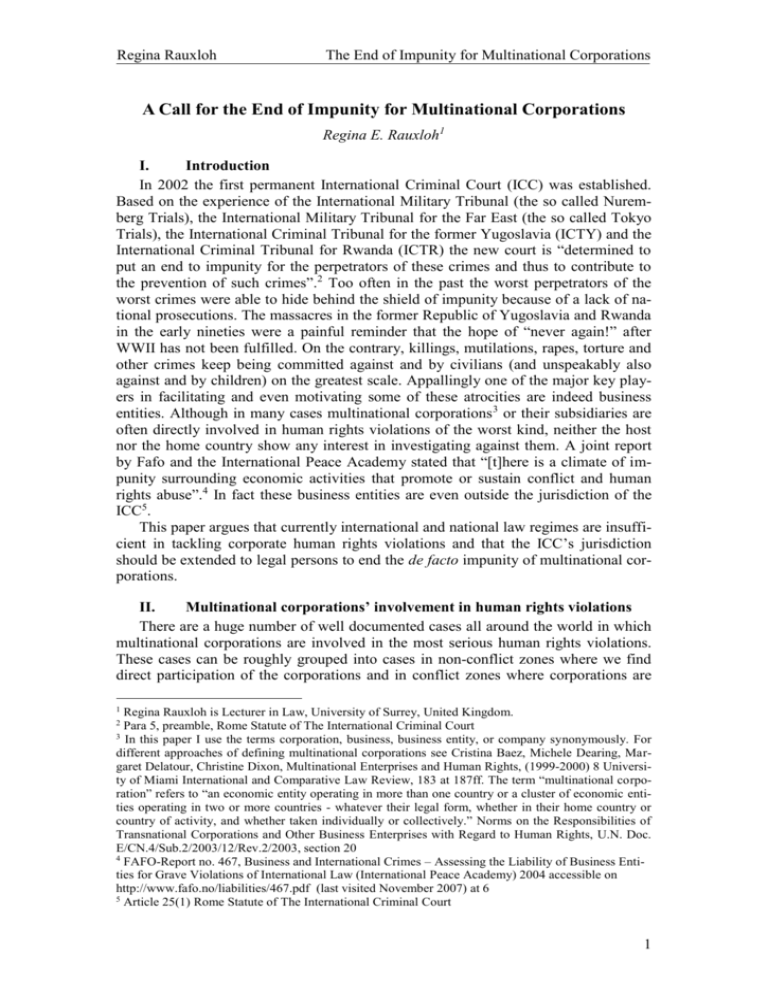
Regina Rauxloh The End of Impunity for Multinational Corporations A Call for the End of Impunity for Multinational Corporations Regina E. Rauxloh1 I. Introduction In 2002 the first permanent International Criminal Court (ICC) was established. Based on the experience of the International Military Tribunal (the so called Nuremberg Trials), the International Military Tribunal for the Far East (the so called Tokyo Trials), the International Criminal Tribunal for the former Yugoslavia (ICTY) and the International Criminal Tribunal for Rwanda (ICTR) the new court is “determined to put an end to impunity for the perpetrators of these crimes and thus to contribute to the prevention of such crimes”.2 Too often in the past the worst perpetrators of the worst crimes were able to hide behind the shield of impunity because of a lack of national prosecutions. The massacres in the former Republic of Yugoslavia and Rwanda in the early nineties were a painful reminder that the hope of “never again!” after WWII has not been fulfilled. On the contrary, killings, mutilations, rapes, torture and other crimes keep being committed against and by civilians (and unspeakably also against and by children) on the greatest scale. Appallingly one of the major key players in facilitating and even motivating some of these atrocities are indeed business entities. Although in many cases multinational corporations3 or their subsidiaries are often directly involved in human rights violations of the worst kind, neither the host nor the home country show any interest in investigating against them. A joint report by Fafo and the International Peace Academy stated that “[t]here is a climate of impunity surrounding economic activities that promote or sustain conflict and human rights abuse”.4 In fact these business entities are even outside the jurisdiction of the ICC5. This paper argues that currently international and national law regimes are insufficient in tackling corporate human rights violations and that the ICC’s jurisdiction should be extended to legal persons to end the de facto impunity of multinational corporations. II. Multinational corporations’ involvement in human rights violations There are a huge number of well documented cases all around the world in which multinational corporations are involved in the most serious human rights violations. These cases can be roughly grouped into cases in non-conflict zones where we find direct participation of the corporations and in conflict zones where corporations are 1 Regina Rauxloh is Lecturer in Law, University of Surrey, United Kingdom. Para 5, preamble, Rome Statute of The International Criminal Court 3 In this paper I use the terms corporation, business, business entity, or company synonymously. For different approaches of defining multinational corporations see Cristina Baez, Michele Dearing, Margaret Delatour, Christine Dixon, Multinational Enterprises and Human Rights, (1999-2000) 8 University of Miami International and Comparative Law Review, 183 at 187ff. The term “multinational corporation” refers to “an economic entity operating in more than one country or a cluster of economic entities operating in two or more countries - whatever their legal form, whether in their home country or country of activity, and whether taken individually or collectively.” Norms on the Responsibilities of Transnational Corporations and Other Business Enterprises with Regard to Human Rights, U.N. Doc. E/CN.4/Sub.2/2003/12/Rev.2/2003, section 20 4 FAFO-Report no. 467, Business and International Crimes – Assessing the Liability of Business Entities for Grave Violations of International Law (International Peace Academy) 2004 accessible on http://www.fafo.no/liabilities/467.pdf (last visited November 2007) at 6 5 Article 25(1) Rome Statute of The International Criminal Court 2 1 Regina Rauxloh The End of Impunity for Multinational Corporations supporting oppressive regimes and their acts of violence. Sometimes these groups overlap.6 1. Human rights violations in non-conflict zones The function of corporations is to constantly increase their profit margins. Indeed 51 of the 100 largest economies in the world are business entities.7 An easy way to avoid high costs of health and safety provisions, environment friendly technology and minimum wages is to operate in a country with low regulation standards. Thus, many corporations decide to outsource certain aspects of their production to countries with low governance regarding labour rights and environmental protections.8 Twenty years ago the average of private foreign direct investment was about a quarter of official development assistance by other states. Today it counts for more than double.9 Many governments cannot afford to discourage foreign investment by introducing more protective legislation. On the contrary, they have to compete with the extent to which they can ensure low-cost services, the so-called ‘race to the bottom’ phenomenon.10 The transfer of production to states with less protective regulations helps multinational corporations not only to cut production costs but also to avoid legal responsibilities.11 In these states [C]itizens are prevented from pushing for legal and institutional protections from industrial hazards; and […] they are prevented from organizing trade unions and other political associations towards the improvement of social and industrial conditions.12 Several kinds of human rights violations arise form the dependency of poorer countries on foreign investment of multinational corporations and the subsequent poor governance. Firstly time and again human rights violations are committed in context of the security management of a multinational corporation or one of their subsidiaries. Companies regularly hire security forces to protect their employers and their assets.13 When these forces commit acts of violence such as torture, killings or abductions with the knowledge or even the instructions of the company the business entity is directly 6 E.g. Bougainville Island, where the exploitation of mining was closely related to the civil unrest. In 1999, the market capitalization of General Electric was roughly equal to the gross domestic product GDP of Thailand. Gretchen Morgenson, MARKET WATCH; A Company Worth More Than Spain?, (1999) The New York Times, December 26 8 Viljam Engström, Who Is Responsible for Corporate Human Rights Violations?, (2002) 2 Institute for Human Rights at Åbo Akademi University, available at http://www.abo.fi/instut/imr/norfa/ville.pdf (last visited November 2007) at 5 9 Gilles Carbonnier, Corporate Responsibility And Humanitarian Action – What Relations Between the Business and Humanitarian Worlds?, (2001) Vol 83 No. 844, International Review of the Red Cross 947, at 950 10 Peter Spiro, New Players on the International Stage, (1997) 2 Hofstra Law and Policy Symposium 19 at 21 11 Francois Rigaux , An International (Criminal) Court for Transnational Companies?, article publié le 5/05/2001, Séminaire de travail: Les activités des sociétés transnationales et la nécessité de leur encadrement juridique Céligny, Genève, 4-5 mai 2001, Attac (Association pour la Taxation des Transactions pour l’Aide aux Citoyens), available at http://france.attac.org/spip.php?article2844 (last visited November 2007) 12 Malcolm J. Rogge, Towards Transnational Corporate Accountability In The Global Economy: Challenging The Doctrine Of Forum Non Conveniens in Re: Union Carbide, Alfaro, Sequihua, And Aguinda (2001) 36 Texas International Law Journal 299, at 314 13 Anita Ramasastry, Corporate Complicity: from Nuremberg to Rangoon – An Examination of Forced Labour Cases and their Impact on the Liability of Multinational Corporations, (2002) 20 Berkeley Journal of International Law 91, at 92 7 2 Regina Rauxloh The End of Impunity for Multinational Corporations criminally responsible. Especially in countries where either the government is too weak to effectively protect foreign assets and employers or where the government itself has a poor human rights record when safeguarding foreign property, multinational corporations often do not control or restrict the violence used by employed private or public security forces.14 In Wiwa v. Royal Dutch Petroleum15 Royal Dutch Petroleum and Shell Transport & Trading Company were accused of being accomplice to human rights violations committed by the Nigerian security forces including the murder of prominent environmental activists. The defendants allegedly provided money, weapons, vehicles and other ammunition to the Nigerian security forces. Further they were accused of having incited at least one of the violent raids on the villages and being directly involved in the fabrication of murder charges which led to the execution of the leaders of the protest.16 In the case against ExxonMobil the company was not only accused of supporting the Indonesian security forces that were hired for protection of company’s property with military equipment, training and buildings where local residents were tortured but also of providing the excavators to dig mass graves for mass killings.17 Secondly, human rights are often directly violated in the course of the manufacturing or extracting natural resources. The greatest abuses are violation of labour rights, such as the right to association, health and safety and appropriate payment.18 Some multinational corporations were even accused of using forced labour.19 One of the most important cases involving forced labour is Doe v. Unocal20 in which Burmese farmers brought action against Unocal Corp. (“Unocal”), Total S.A. (“Total”), the Myanma Oil and Gas Enterprise (“MOGE”), and the State Law and Order Restoration Council (“SLORC”). They claimed that these companies through the SLORC and other Burmese intelligence and military forces used “violence and intimidation to relocate whole villages enslave farmers living in the area of the proposed pipeline, and steal farmers' property for the benefit of the pipeline.”21 Often there is an overlap with the first group as workers or local communities who protest against the corporations’ activities are violently suppressed by security forces. In other cases multinational corporations are involved in violent acts against trade unions. In the case against Coca-Cola it was argued that Coca-Cola and its business partners maintained an open relationship with paramilitary death squads who kid14 Kathryn Gordon, OECD, Directorate for Financial, Fiscal and Enterprise Affairs -Working Papers on International Investment, (May 2002) no. 2002/1, Multinational Enterprises in Situations of Violent Conflict and Widespread Human Rights Abuses, para 18 15 Wiwa v. Royal Dutch Petroleum, 226 F.3d 88 (2d Cir. 2000). “According to the complaint, Shell Nigeria coercively appropriated land for oil development without adequate compensation, and caused substantial pollution of the air and water in the homeland of the Ogoni people. A protest movement arose among the Ogoni. Ken Saro-Wiwa was an opposition leader and President of the Movement for the Survival of the Ogoni People (MSOP); John Kpuinen was a leader of the MSOP's youth wing.” at 92 16 Wiwa v. Royal Dutch Petroleum, 226 F.3d 88 (2d Cir. 2000) at 92 17 See Audrey Gillan, Exxon Accused of Rights Abuses, (2001) The Guardian, June 22, available at http:// www.guardian.co.uk/indonesia/Story/0,2763,510896,00.html (last visited November, 2007) and Aceh: Lawsuit accuses Exxon Mobil of Complicity in Abuses, (August 2001) Down to Earth, available at http:// www.gn.apc.org/dte/50Ach.htm. (last visited November, 2007) 18 On corporate involvement in child labour see Christopher Kern, Child Labour: The International Law and Corporate Impact, (2000) 27 Syracuse Journal of International Law and Commerce 177 19 Ramasastry supra note 13 at 92 20 Doe v. Unocal, 963 F. Supp. 880 (C.D. Cal. 1997) 21 Ibid. at 883. Plaintiffs alleged that they and their families had death of family members, assault, rape and other torture, forced labour, and the loss of their homes and property. 3 Regina Rauxloh The End of Impunity for Multinational Corporations napped, tortured and even killed trade union organisers.22 Another problem is the forced displacement of local (often indigenous) communities in order to make space for the extraction sites or pipelines. Such problems have been reported in Burma, Columbia, Congo-Brazzaville, Indonesia, Nigeria and Sudan.23 The OECD working paper on international investment has found that Investment projects that displace people involuntarily may give rise to severe economic, social, and environmental problems: production systems are dismantled; productive assets and income sources are lost; people are relocated to environments where their productive skills may be less applicable and the competition for resources greater; community structures and social networks are weakened; kin groups are dispersed; and cultural identity, traditional authority, and the potential for mutual help are diminished24 In the case against the US mining company Freeport-McMoRan25 the defendant was even accused of cultural genocide of the Amungme tribe. The egregious human rights and environmental violations, which have terrorized the tribal communities of the Amungme and other Indigenous tribal people, destroyed their natural habitats and caused dislocation of the populations have resulted in the purposeful, deliberate, contrived and planned demise of a culture of indigenous people whose rights were never considered, whose heritage and culture were disregarded and the result of which is ultimately to lead to the cultural demise of unique pristine heritage which is socially, culturally and anthropologically irreplaceable.26 2. Human rights violations in conflict zones While some countries try to avoid loosing private foreign investment by minimising labour protection and environmental preserving legislation, in other countries effective governance and accountability are absent because they are ridden by violent conflict or even a civil war.27 In this group of cases the accused multinational corporations do not primarily benefit from the human rights violations themselves (e.g. by oppression of trade unions or freeing land from villages for a pipeline) but from a close relationship with an oppressive government or regime. This enables them to exploit natural resources in the conflict zones28 and trade in conflict commodities.29 In this way private business facilitates the ongoing violence by supplying the oppressors with the revenue needed to fund the armed conflict30 and to access global arms mar- 22 Sinaltrainal, et al. V Coca-Cola Co., 256 F. Supp. 2d 1435, S.D. Fla. (2003). See also Charly Cray, Coke Abuse in Columbia, Multinational Monitor (2001), available at http:// www.essential.org/monitor/mm2001/01september/sep01front.html (last visited November, 2007); Aram Roston, It's The Real Thing: Murder, (2001) The Nation, Sept. 3, available at http://www.thenation.com/doc/20010903/roston (last visited November, 2007) 23 Ibid. at para 22 24 Ibid. at para 19 25 Beanal v. Freeport-McMoRan, Inc., 969 F. Supp. 362, (E.D. La. 1997) 26 Ibid. at 372 27 FAFO report supra note 4 at 6 28 Ibid. at 12 29 The involvement of business entities making profit by cooperating with oppressive regimes is not a new phenomenon. During World War II no less than several hundred companies used slave labour provided by the Nazis. Ramasastry supra note 13 at 105ff. For civil suits for violations of human rights see also Craig Scott, Translating Torture into Transnational Tort: Conceptual Divides in the Debate on Corporate Accountability for Human Rights Harm, in Torture as Tort: Comparative Perspectives on the Development of Transnational Human Rights Litigation (Oxford: Hart Publishing, 2001) 46-63 30 FAFO report supra note 4 at 6 4 Regina Rauxloh The End of Impunity for Multinational Corporations kets.31 For example the Weir group, a Glasgow based manufacturer of oil pumps, was accused of having a close relationship with the Khartoum government and helping to finance its violent attacks against the population in the south of Sudan.32 Other examples of conflict commodities are oil in countries such as Sudan, Columbia and Chechnya, gold and coltan33 in the Democratic Republic of Congo and diamonds in Angola, the Democratic Republic of Congo and Sierra Leone.34 The latter is a sad example of a country which is wracked by civil war funded and encouraged by the diamond trade. The war started in Sierra Leone in 1991 by the Revolutionary United Front (RUF) who are now controlling a third of the country. There is no ethnic or religious conflict and apparently they do not have support of the population.35 The RUF have never declared any ideological or political claim for their uprising36 and experts agree that the aim of this war is control of the diamond production.37 This war has displaced about a quarter of the civilian population and resulted in horrendous crimes such as killings, rapes and mutilations. Organised violence, at least in its modern forms, requires considerable capital equipment, specialised personnel and significant organisational, technological and financial capabilities.38 The saddest part of this story is that children as young as eight are being subscribed to take part in this brutal conflict. The trade in diamonds with multinational corporations allowed the rebels to purchase weapons light enough for children to carry.39 Additionally, they can use the revenues to fund the drugs which are needed to make children more aggressive and able to commit these atrocities while at the same time control them through their addiction.40 In addition to the provision of funding, there are cases where multinational corporations offered direct assistance. In Rwanda, for example, coffee companies stored arms and equipment for the perpetrators of the 1994 genocide.41 In the case Sarei v Rio Tinto the defendants were accused of aiding and abetting to war crimes, including 31 Ibid. Saeed Shah, Weir Group Stands Firm Over Sudan, (2001) The Independent, Aug. 23, available at http://news.independent.co.uk/business/news/article211561.ece (last visited November 2007) 33 Coltan is a precious mineral used in cell phones, computer chips, nuclear reactors, and PlayStations. 34 on conflict diamonds see also Lucinda Saunders, Rich And Rare Are The Gems They War: Holding De Beers Accountable For Trading Conflict Diamonds (2001) 24 Fordham International Law Journal 1402 35 Diane Marie Amann, Capital Punishment: Corporate Criminal Liability for Gross Violations of Human Rights, (2001) 24 Hastings International and Comparative Law Review, 327 at 329 36 Saunders supra note 34 at 1424 37 Ibid. at 1403. The problem with diamonds is that they can be very easily smuggled because of their small size and the fact that they cannot be detected by e.g. sniffing dogs. Furthermore, diamonds cannot be traced, thus once they have been smuggled out of the country they cannot be identified as conflict diamonds. 38 Gordon supra note 14 at para 25 39 Report of the Panel of Experts Appointed Pursuant to UN Security Council Resolution 1306 (2000), Paragraph 19, in Relation to Sierra Leone, U.N. Doc. S/2000/1195 (2000), available at http://www.sierra-leone.org/panelreport.html (last visited November 2007) 40 Amann supra note 36 at 330. Impact of Armed Conflict on Children: Report of the Expert of the Secretary-General, Ms. Graça Machel, Submitted Pursuant to General Assembly Resolution 48/157, U.N. GAOR, 51st Sess., Agenda Item 108 PP 27, 47, U.N. Doc. A/51/306 (1996) 41 David Kinley and Junko Tadaki, From Talk To Walk: The Emergence Of Human Rights Responsibilities For Corporations At International Law, (2004) 44 Virginia Journal of International Law 931 at 969. 32 5 Regina Rauxloh The End of Impunity for Multinational Corporations military bombings of civilian targets, torture, rape and genocide.42 It has to be recognised now that the “influence of some multinational corporations on war situations and on parties to conflict is growing steadily.”43 III. Legal responses From the many cases where multinational corporations are directly involved in serious human rights violations it becomes clear that the international community cannot keep tolerating such business practices. Already corporate behaviour is governed by different legal regimes under international law, national law and voluntary codes of conducts. This section will demonstrate, however, that these legal regimes are too weak to be effective. 1. International Law In 1976 the Organisation for Economic Co-operation and Development (OECD) adopted guidelines for multinational enterprises44 which have been revised six times since.45 The Guidelines consist of recommendations to enterprises covering areas such as human rights, employment, environments and consumer interest. Only 40 countries are adherent to the Guidelines which are not binding and not enforceable.46 Unlike other international instruments the Guidelines provide for so-called National Contact Points (NCP). These are national offices whose task is to promote and to implement the Guidelines. They receive and assess complaints against multinational corporations who are alleged of breeching the Guidelines. If an NCP decide the issue deserves further consideration they offer assistance to the parties in resolving the disagreement, e.g. mediations or conciliation.47 The weaknesses of such a system are apparent: there are no sanctions against multinational corporations for not adhering to the Guidelines.48 Moreover, mediation seems inappropriate when dealing with cases of multiple human rights violations. Further, the NCP have discretion whether to decide that the complaint does not require further action. This role of gatekeepers to the system for national offices is problematic as it often does not lie in the state’s best interest to act against multinational corporations who offer employment, revenue and prestige to the national government. In many cases the business in question is even accused of acting in concert with the state. Against the initial assessment of the complaint by the NCP there is no right to appeal. Thus, it does not come as a surprise that since 1976 only 24 cases were heard of which only two occurred after 1990. A range of instruments were instigated by the International Labour Organisation (ILO). So far it has adopted 184 conventions dealing with the protection of workers’ 42 FAFO report supra note 4 at 16 Carbonnier, supra note 9 at 950 44 http://www.oecd.org/dataoecd/56/36/1922428.pdf [hereinafter Guidelines]. The Guidelines are a part of the Declaration on International Investment and Multinational Enterprises available at http://www.itcilo.it/actrav/actrav-english/telearn/global/ilo/guide/oecddec.htm (last visited November 2007). 45 in 1979, 1982, 1984, 1991 and 2000. The latest version can be accessed at http://www.oecd.org/dataoecd/56/36/1922428.pdf (last visited November 2007) 46 The 30 members of the OECD plus Argentina, Brazil, Chile, Egypt, Estonia, Israel, Latvia, Lithuania, Romania and Slovenia 47 Barnali Choudhury, Beyond the Alien Tort Claims Act: Alternative Approaches to Attributing Liability to Corporations for Extraterritorial Abuses, 26 Northwestern Journal of International Law and Business, 43 (2005) at 64 48 Ibid. 43 6 Regina Rauxloh The End of Impunity for Multinational Corporations rights such as abolition of forced labour (Conventions 29 and 105), rights to freedom of association and collective bargaining (Conventions 87 and 98), prevention of discrimination in employment and equal pay for work of equal value (Conventions 111 and 100), minimum age for employment and child labour (Conventions 138 and 182) and industrial accidents, safety and health (Conventions 174 and 176).49 One of the major instruments is the Tripartite Declaration of Principles Concerning Multinational Enterprises and Social Policy and the Declaration on Fundamental Principles and Rights at Work of the International Labour Organization from 1977.50 This declaration not only regulates the conduct of multinational corporations but also defines the terms of relations with host countries. Like the OECD Guidelines the ILO instruments are not binding and lack sanctions. The main purpose is to use diplomacy, dialogue and moral persuasion to encourage compliance by the member states rather than policing multinational corporations. The United Nation (UN) Sub-Commission for the Promotion and Protection of Human Rights formulated in 2003 the Norms on the Responsibilities of Transnational Corporations and Other Business Enterprises with Regard to Human Rights.51 These Norms confirm that multinational corporations are not only subjects to human rights but also have human duties and responsibilities.52 Para 3 of the preamble emphasises the co-responsibility of governments and multinational corporation: Recognizing that even though States have the primary responsibility to promote, secure the fulfilment of, respect, ensure respect of and protect human rights, transnational corporations and other business enterprises, as organs of society, are also responsible for promoting and securing the human rights set forth in the Universal Declaration of Human Rights The Norms compile only human rights norms that already exist in other international instruments rather than creating new responsibilities or extending existing protection. An improvement can be found in sections 15-19 where the Norms provide for a three step implementation mechanism. At the first level multinational corporations are expected to incorporate the Norms in their contracts with all business partners and “adopt, disseminate and implement internal rules of operation in compliance with the norms.”53 At the second level the Norms requires transparent and independent monitoring systems through existing UN, national or international instruments which already exist or need to be created.54 The third step addresses national states who are asked to ensure implementations of the Norms through their administrative framework.55 Moreover, the Norms provide for reparations, restitution, compensation and 49 International Restructuring Education Network Europe (IRENE), Controlling Corporate Wrongs: The Liability Of Multinational Corporations Legal Possibilities, Initiatives and Strategies for Civil Society - Report of the international IRENE seminar on corporate liability and workers' rights held at the University of Warwick, Coventry, United Kingdom, 20 and 21 March 2000, available at http://www.cleanclothes.org/publications/corp-1.htm (last visited November 2007) at 7 50 available at http://www.ilo.org/public/english/employment/multi/download/english.pdf (last visited November 2007). 51 U.N. ESCOR, 55th Sess., 22d mtg. at Agenda Item 4, U.N. Doc. E/CN.4/Sub2/2003/12/Rev.2 (2003) [hereinafter Norms]. See also Commentary on the Norms on the Responsibilities of Transnational Corporations and Other Business Enterprises with Regard to Human Rights, U.N. Doc. E/CN.4/Sub.2/2003/38/Rev.2 (2003) 52 Norms preamble para 14 53 Norms para 15 54 Norms para 16 55 Norms para 17 7 Regina Rauxloh The End of Impunity for Multinational Corporations rehabilitation for any damage done or property taken for the victims of noncompliance with the Norms.56 Although the Norms do not have the status of a UN treaty they present an important legal norm for corporate responsibility because of these suggested enforcement mechanisms. Nevertheless the Norms suffer certain limitations. For example they rely on monitoring mechanisms without specifying which agencies exactly they are referring to and without formulating an obligation to establish any. Likewise they provide for a number of remedies which are to be determined by national and international tribunals without specifying which tribunals are appropriate.57 This question is of course vital where a corporation is operating in a number of different countries.58 Moreover the Norms are short of guidelines on appropriate procedures. For example as Choudhury points out, the Norms fail to explain how damages should be calculated.59 Another problem is that like the OECD Guidelines the UN Norms rely on implementations of national states whereas we already have seen that victims often face the problem of the states reluctant to oppose multinational corporations. [T]the current international economic order of trade liberalization and economic globalisation, in which workers’ rights and environmental considerations are increasingly seen as barriers to free trade, places multinational corporations in positions of extraordinary power and equally extraordinary lack of accountability to anything except their shareholders”60 Another significant international instrument is the UN Global Compact Initiative developed 1999 by the former UN Secretary General Kofi-Anan which promotes a set of shared values and corporate citizenship.61 Indeed Global Compact calls itself “the world’s largest, global corporate citizenship initiative”.62 It formulates ten63 basic human rights principles which should be respected by businesses.64 The two major objectives of Global Compact are to “[m]ainstream the ten principles in business activities around the world [and to c]atalyse actions in support of broader UN goals, such as the Millennium Development Goals”.65 The initiative offers several mechanisms for enforcement such as Policy Dialogues, Learning, Country/Regional Networks, and Partnership Projects.66 Unlike the Norms, Global Compact relies on the co-operation 56 Norms para 18 Norms para 18 58 This is especially relevant for the question of forum non-convenience, see below. 59 Choudhury supra note 47 at 66 60 IRENE supra note 49 at 1 61 Available at http://www.unglobalcompact.org/AboutTheGC/index.html. [herein after Global Compact] (last visited November 2007) 62 Ibid. 63 The tenth principle was added 24 June 2004, during the UN Global Compact Leaders Summit. 64 1. Businesses should support and respect the protection of internationally proclaimed human rights. 2. Make sure they are not complicit in human rights abuses. 3. Businesses should uphold the freedom of association and the effective recognition of the right to collective bargaining; 4. The elimination of all forms of forced and compulsory labour; 5. The effective abolition of child labour; 6. Eliminate discrimination in respect of employment occupation. 7. Business should support a precautionary approach to environmental challenges; 8. Undertake initiatives to promote greater environmental responsibility; 9. Encourage the development and diffusion of environmentally friendly technologies. 10. Businesses should work against corruption in all its forms, including extortion and bribery. 65 http://www.unglobalcompact.org/AboutTheGC/index.html (last visited November 2007) 66 Ibid. 57 8 Regina Rauxloh The End of Impunity for Multinational Corporations of multinational corporations rather than monitoring or policing them. The Global Compact is not a regulatory instrument – it does not “police”, enforce or measure the behaviour or actions of companies. Rather, the Global Compact relies on public accountability, transparency and the enlightened self-interest of companies, labour and civil society to initiate and share substantive action in pursuing the principles upon which the Global Compact is based.67 Neither independent monitoring mechanisms nor any form of sanctions or compensation for the victims are offered. As it was seen, the existing international instruments are not-binding, unenforceable and therefore largely ineffective. Although the growing expectations of corporate social responsibility and global citizenship have to be welcome these concepts are only adhered to, to the extent to which it is profitable for the corporations to do so. In addition, often the effectiveness of these conventions depends on national enforcement which has its own limitations as often governments are either unwilling or unable to effectively regulate and control multinational corporations. 2. National law Although national states have the obligation to safeguard human rights by enforcing legislation regarding natural as well as legal persons, in practice national enforcement has to cope with a number of different problems. On the one hand the race to the bottom mentioned above can lead to minimisation of governance. Sri Lanka is just one example of a country which has created free trade zones where national law applies only to a limited extend.68 On the other hand where military forces of the state co-operate with a multinational corporation one can speak of a de facto legal vacuum.69 In both of these cases the only hope for victims to find justice are the national laws of the home country of the corporation. 2.1. Civil Liability Surprisingly, the United States who are often accused of disregarding international law are the only country where non-citizens can bring civil action for torts that have been committed abroad.70 The Alien Tort Claims Act (ACTA) 1789 states that "[t]he district courts shall have original jurisdiction of any civil action by an alien for a tort only, committed in violation of the law of nations or a treaty of the United States".71 This act was rarely used until the landmark case Filartiga v. Pena-Irala in 198072 where the court awarded $10.4 million for a tort committed in Paraguay. Since then ACTA has been used more frequently to bring actions for human rights violations allegedly committed by multinational corporations.73 However, claimants meet a number of difficulties when bringing a case under ACTA. One difficulty is the very high 67 Ibid. IRENE supra note 49 at 3 69 Ibid. 70 But it was also the US who opposed Belgium legislation which enforced universal jurisdiction. See below. 71 28 USC § 1350 72 Filartiga v. Pena-Irala 630 F.2d 876, 887 (2d Cir. 1980) 73 For example See, e.g., Abebe-Jira v. Negewo, 72 F.3d 844 (11th Cir.1996); Kadic v. Karadzic, 70 F.3d 232 (2d Cir.1995); In Re Estate of Ferdinand Marcos, 25 F.3d 1467 (9th Cir.1994); Tel-Oren v. Libyan Arab Republic, 726 F.2d 774 (D.C.Cir.1984); Filartiga v. Pena-Irala 630 F.2d 876; Xuncax v. Gramajo, 886 F.Supp., Doe I v. Unocal Corp., 395 F.3d 932. 68 9 Regina Rauxloh The End of Impunity for Multinational Corporations jurisdictional threshold of the forum non conveniens74 according to which a case may be dismissed if the court deems that a foreign jurisdiction the more appropriate forum. 75 A noteworthy exception is the English Lubbe case where the House of Lords hold that although “South Africa was the more appropriate forum, the strong probability that the claimants would be unable to obtain both the legal representation and the expert evidence required to substantiate their claims in South Africa would amount to a denial of justice”.76 A different obstacle is that for most human rights violations the claimant has to show state action which is very difficult to prove.77 A further problem is the high factual threshold of evidence and the difficulties for individuals to get access to evidence against a multinational corporation.78 Thus, actions under ACTA are rarely successful and so far no case has been decided on its merits.79 Another available law is the American 1992 Torture Victim Protection Act (TVPA)80 which provides civil action to US citizens as well as non-citizens for acts of torture and extra-judicial killings committed by individuals acting under the actual or apparent authority of a foreign government.81 Important cases are for example Daliberti v. Republic of Iraq82 or Weinstein v. Islamic Republic of Iran.83 The only other national legislation under which non-citizens can bring action against human rights violations was the Belgium Act Concerning the Punishment of Grave Breaches of International Humanitarian Law.84 This act was used in the cases of alleged forced labour in Myanmar and involvement of mistreatment in Iraq.85 As soon as cases were brought against high profile Western politicians such as George W. Bush, Donald Rumsfeld, Colin Powell and Tony Blair the United States put Belgium under considerable pressure to discontinue prosecutions under this act and consequently jurisdiction for this act was limited to Belgium citizens and long-term residents.86 74 For a criticism of the doctrine see Kathryn Lee Boyd, The Inconvenience of Victims: Abolishing Forum Non Conveniens in U.S. Human Rights Litigation, (1998) 39 Virginia Journal of International Law 41, at 46 75 Saunders supra note 34 at 1453 76 Lubbe v. Cape Plc. [2000] 4 All E.R. 268. Another example is Connelly v RTZ Corp Plc (No.2), [1997] 4 All E.R. 335 in which the court rejected the claim that Namibia was the appropriate forum but which was later struck down on limitation grounds. However these are English cases and not binding on American courts applying ACTA. 77 E.g. the cases Unocal II, 110 F. Supp. 2d 1294, 1305 (C.D. Cal. 2000); and Beanal v. FreeportMcMoRan, 969 F. Supp. 362, 373-74 (E.D. La. 1997) were dismissed because the claimants could not show the required level of State action. 78 Saunders supra note 34 at 1453 79 Choudhury supra note 47 at 44 80 106 Stat. 73 (1992) 81 For other cases of national jurisdiction see Choudhury supra note 47 at 52ff. 82 97 F.Supp.2d 38 (D.D.C. 2000) in which United States citizens sued the government of Iraq for allegedly having being tortured and taken hostage in Iraq. 83 184 F.Supp.2d 13 (D.D.C. 2002) in which action was brought against the government of Iran for sponsoring a terrorist group who carried out suicide bombings on an Israeli passenger bus which killed United States citizens. 84 For an English translation of the Act, see 38 I.L.M. 918 (1999). 85 Choudhury supra note 47 at 46 86 Days after Rumsfeld warned Belgium that the US would refuse to release money for the new headquarters for NATO in Brussels while its officials remained under threat of prosecution Guy Verhofstadt, the Belgian prime minister, proposed reducing the jurisdiction to cases where the victim of the alleged violation or the accused were Belgian citizens or long-term residents in Belgium. Universal Incompetence, (2003) Economist, June 28, at 54 10 Regina Rauxloh The End of Impunity for Multinational Corporations 2.2. Criminal Liability Although every human rights violation amounts to a criminal offence in every country national criminal prosecutions against multinational corporations are very rare for a number of reasons. One problem is the lack of independency of investigation agencies who are the gatekeepers to the criminal justice system. Although the key role players such as judges, prosecutors and police are to a certain degree politically independent, when using their discretion they have to respect general policy guidelines of their government.87 As was pointed out previously often it is not in the national interest to investigate against a business that brings revenue, employment and prestige to the country. 88 Especially multinational corporations can exert considerable political and economical pressure both on host as well as home country. Furthermore, investigating in human rights violations abroad is always politically sensitive as it either suggests lack of governance or even involvement of the host country in the crimes. Besides, in the home countries these cases do not have high priority in the public eye. Although citizens become more sensitive to corporate crimes they still are more perceptive of street crime than white collar crime. In addition, the public is more concerned with their safety at home rather than with the living conditions of people in a remote country. An additional problem is that these cases are incredibly resource intensive. Not only do corporate cases involve an enormous amount of documentary evidence but investigators need to get access to evidence abroad, especially identify and questioning foreign citizens. This does not only require extra resources but also transnational co-operation. Given the limited budget for criminal investigation and the growing caseload police and prosecutors are not inclined to allocate much of these resources to crimes that have been committed abroad and the victims are not citizens of the state. Besides the political and practical problems there are also a number of legal difficulties in prosecuting multinational corporations. Although criminal justice systems around the world have now extended criminal responsibility to legal persons, traditionally criminal law is constructed in view of living human beings. Thus it is very difficult to translate notions of guilty actions and guilty mind to legal entities. Moreover it is hard to distinguish between the actions of the natural persons who are actually making a business decision and the legal person for which it is made.89 Even if the mens rea can be attributed to the decision-making body of a company abroad it is very difficult to attribute it to the parent multinational corporation in the home country. Another problem is to decide which country has jurisdiction over a multinational corporation.90 Considering these manifold practical and legal difficulties the lack of criminal prosecutions of multinational corporations does not surprise. 3. Codes of Conduct A growth in public awareness of social and environmental costs in recent years has signalled multinational corporations that overly cheap production can be unprofitable if it harms their brand image. Since the 1990ies we can observe a rapidly grow- 87 FAFO report supra note 4 at 22 Ibid. 89 Ibid. at 23 90 Rigaux supra note 11. Possible criteria could be the country where the multinational corporation has requested legal identity, where it has its headquarter, or the place where the main decisions are taken. 88 11 Regina Rauxloh The End of Impunity for Multinational Corporations ing number of private voluntary initiatives such as Social Labelling (SL)91, Framework Agreements (FA)92 and codes of conduct.93 Codes of conduct are defined as “commitments voluntarily made by companies, associations or other entities which put forth standards and principles for the conduct of business activities in the marketplace”.94 These voluntary codes are designed to demonstrate a notion of corporate citizenship to the consumers. Corporate social responsibility has now been upgraded to a marketing strategy and according to Kinley/Tadaki “[o]ne would be hard-pressed to find any major corporation today that did not make some claim to abiding by a code of conduct that comprised, at least in part, adherence to human rights standards.”95 Indeed, a study by the OECD in 2001 found 246 codes of conducts of which 118 were imitated by individual companies, 92 by industry and trade associations, 32 by partnerships between stakeholders and 4 by inter-governmental organizations.96 Examples of the most prominent codes of conducts are: U.S. Apparel Industry Partnership's Workplace Code of Conduct;97 The Sullivan Statement of Principles (4th Amplification), an US based initiative that established guidelines for multinational corporations operating in South Africa during apartheid; 98 Irish National Caucus, The MacBride Principles, which created a code of conduct for multinational corporations operating in Northern Ireland;99 Social Accountability 8000 Standard established by the Social Accountability International (SAI) in 1997 and revised in 2001 focus on securing humane workplaces;100 Worldwide Responsible Apparel Production (WRAP) is “dedicated to the certification of lawful, humane and ethical manufacturing throughout the world”101 which requires manufacturers to comply with the WRAP Production Principles which provide for safe and healthy workplace conditions, and respect for workers' rights principles. Codes of conduct can develop some legal consequences.102 They can be used in 91 Certification Systems and Social Quality Labels, e.g. ETI (Ethical trade Initiative, UK), FLA (Fair Labour Association, USA), FWF (Fair Wear Foundation, NL), TCFUA (Textile, Clothing and Footwear Union of Australia, WRC (Worker Right Consortium, USA), WRAP (Worldwide Responsible Apparel Production, USA) 92 This is an agreement between a multinational corporation and an international trade union organization concerning the international activities of the company. 93 For a more detailed debate on codes of conduct see Choudhury supra note 47, at 63ff 94 OECD Working Party of the Trade Committee, Codes of Corporate Conduct: An Inventory (1999) available at http:// www.oecd.org/ech/index_2.htm (last visited November 2007) at 5 95 Kinley/Tadaki supra note 41, at 953 96 OECD, Working Papers On International Investment, Number 2001/6, Codes of Corporate Conduct: Expanded Review of their Contents, May 2001 available at http://www.oecd.org/dataoecd/57/24/1922656.pdf (last visited November 2007) 97 April 14, 1997, available at http://www.itcilo.it/actrav/actravenglish/telearn/global/ilo/guide/apparell.htm (last visited November 2007) 98 Nov. 8, 1984, available at (1985) 24 International Legal Materials 1464, at 1496 99 December 1997, available at http://www1.umn.edu/humanrts/links/macbride.html (last visited November 2007) 100 http://www.sa-intl.org/_data/n_0001/resources/live/2001StdEnglish.pdf (last visited November 2007) 101 http://www.wrapapparel.org (last visited November 2007) 102 Halina Ward, Legal Issues in Corporate Citizenship - Prepared for the Swedish Partnership for 12 Regina Rauxloh The End of Impunity for Multinational Corporations courts to define the standard of care owned to employers, business partners or local communities. Further, they can be adopted by regulatory agencies as reporting requirements and standards of the codes can constitute grounds for claims of misrepresentation or misleading conduct.103 Although an increasing awareness of corporate social awareness and resulting commitments are welcome there are a number of major criticisms. First of all, these codes are not directly enforceable and there are no remedies provided for breeches so that one has to ask whether these codes are anything more than lip service.104 Anderson even speaks of a “mere public relations gimmick”.105 Secondly, there is no agreement on how the conduct of the participating corporations will be monitored. 34% of the studied codes do not address the question of monitoring at all.106 This is not surprising considering how difficult it is to regulate an effective system of monitoring: Should there be an auditing process and if yes, how independent would the auditors need to be? Should the monitoring process be made open to the wider public? Should trade unions, local authorities and NGOs be involved or have a right to participate? How can a monitor mechanism reconcile different standards of different codes?107 Other problems stem from the huge number of codes. Since multinational corporations work in a lot of different countries and with many different business partners they have to deal with various different codes and different standards.108 Further, the growing number of codes could minimise their effectiveness and can lead to “code fatigue”.109 Thus even some business leaders favour international agreement to ensure equal standard of obligations among all companies110 to “restore a level laying field for competitors”.111 More importantly, a growing number of voluntary codes of conduct could invite governments to rely increasingly on soft law rather than introducing binding legislation. Thus, experts warn that rather than complementing national and international legislation voluntary codes of conducts could replace them.112 4. The Need for International Criminal Law On must keep in mind that the primary purpose of corporations is to maximise profit rather than engaging in social welfare. 113 No matter how economical and political powerful multinational corporations are one must distinguish between the role of state and business. It is also inappropriate to condemn multinational corporations while overlooking the great benefits they bring to their host and home countries. Baez et al reminds us that multinational corporations Global Responsibility, (February 2003 ) available at http://www.observatoriorsc.org/descargas/biblioteca/documentos/guias/legalactioninCSR.pdf (last visited November 2007) at 5 103 Kinley/Tadaki supra note 41 at 957 104 Kinley/Tadaki supra note 41 at 955 105 John Christopher Anderson, (2000) University of Pennsylvania Journal of Labor and Employment Law 463, at 489 106 OECD study 2001 at 26 107 Kinley/Tadaki supra note 41at 955f 108 U.N. Conference on Trade and Development, The Social Responsibility of Transnational Corporations, U.N. Doc. UNCTAD/ITE/IIT/Misc.21 (1999), available at http://www.unctad.org/en/docs/poiteiitm21.en.pdf. (last visited November 2007) at 47. 109 Ibid. 110 Carbonnier, supra note 9 at 955 111 Ibid. at 956 112 Ibid. at 955 113 Kinley/Tadaki supra note 41 at 961 13 Regina Rauxloh The End of Impunity for Multinational Corporations directly and indirectly influence more lives in developed countries and in less developed countries than any other global institutions, except for a few intergovernmental organizations such as the United Nations, the World Bank, and the International Monetary Fund.114 Conversely, this does not release corporations from the duty to respect human rights of their workers and the communities they are operating in. On the contrary this influence means greater responsibility and if multinational corporations go so far as to commit gross human rights violations the international community needs to end their existing de facto impunity. It has been asked whether it is appropriate to make a corporation which is a legal entity rather than a moral being criminally responsible. However, already a number of international legal instruments create criminal liability for legal persons. For example the Basel Convention on Hazardous Wastes115 which criminalises traffic of hazardous waste116 addresses natural as well as legal persons.117 Furthermore unlike selfregulation and civil law, criminal law offers punishment. The two most relevant functions of criminal sanctions in this context are deterrence and stigmatisation. An international criminal conviction of a multinational corporation would present such a strong condemnation of the international community that it would force all major multinational business to rethink their modes of operation and their relationships with subsidiary companies as well as the political regimes in the host countries. Already we have seen how sensitive multinational corporations are to consumer opinions. No multinational corporation could afford to be officially labelled as an accomplice to genocide or war crimes. The deterrent effect of the condemnation of an international conviction would be more effective than any civil law remedy. Although civil law can award punitive damages these cannot address the culture of profiting from conflict commodities and war economy and will only be factored in as additional costs. Even if one would argue that legal persons cannot be made morally responsible it is this deterrent effect which might prevent other victims from suffering that is sufficient to justify the extension of criminal responsibility to corporations. It is clear that a large number of today’s conflicts where civilians are tortured, kidnapped, displaced, mutilated, raped and killed could not have occurred without the help of traders of conflict commodities, bankers, arm dealers and financiers.118 If just one oppressive regime could not afford to buy new training and weapons to suppress its people the criminal conviction would have been worthwhile. Further, if multinational corporations have to fear criminal prosecution for accessory liability for the crimes committed by a repressive regime, a bad human rights record of a country might deter foreign investment. 119 Thus the deterrent effect of a criminal prosecution would spill over not only to other multinational corporations but even to host countries. Multinational corporations nowadays play an increasingly growing part of social life and thus must recognise social responsibility. 120 Although there is a net of inter114 Baez et al supra note 3 at 184 Basel Convention on the Control of Transboundary Movements of Hazardous Wastes and Their Disposal 116 Article 4(3) 117 Article 2(14) 118 William Schabas, Enforcing International Humanitarian Law: Catching the Accomplices, (2001) Vol. 83, No. 842 International Review of the Red Cross 439, at 441 119 Saunders supra note 34 at 1476 120 Ramasastry supra note 13 at 96 115 14 Regina Rauxloh The End of Impunity for Multinational Corporations national national and soft law instruments these mechanisms are fairly ineffective and so far did not succeed in preventing multinationals from getting indirectly or directly involved in gross human rights violations. Thus, in the most sever cases the international community needs to extend international criminal law as ultimo ratio to enforce human rights and end de facto impunity of multinational corporations. 15

